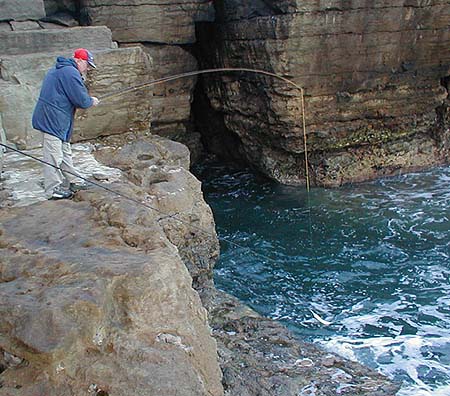
Tackle and Tactics
Mike Ladle
Information Page.
How hard do fish fight?
This piece was written years ago so bits of it are out of date. For example my tackle has changed quite a lot in that I now use braided lines and better rods and reels. Even so I am still a bit of a tackle minimalist. Also I have now caught lots of hard fighting fish in tropical waters. The warm water seems to give them added zip. Nonetheless most of the conclusions stand.
----- A few days ago we had a strong easterly blow along the Purbeck coast. I knew it would have given the sea a good stir up and at this time of year (early October) dirty water means that there is a good chance of big bass or conger. As luck would have it the wind, after blowing all day Saturday, dropped right away on Sunday so I rang my pal Stuart Clough to ask what he thought about an evening’s shore fishing. Together with another friend, Richard, we decided to fish from a little stone slipway that is often haunted by big fish.
We arrived on the shore two hours before high water and began to fish. I had brought a few ragworms so we began by fishing with light tackle for some bait. The fish would not co-operate and apart from an eel of about a pound and a small pouting (Stuart’s first ever - used as bait) there was nothing doing. Richard had one decent run on a mackerel head but it came to nothing and the culprit did not return. Just after high water I packed in and went home leaving the other two to have a few more casts.
Next day, at work, Stu told me that, after I left, he had caught a rockling and, just before they gave up, they decided to have a look in the waters edge. Despite the previous days storm the sea was quite calm and clear and they were astonished to see that the swell was seething with four-inch mullet. There were so many of these little fish that Richard was able to scoop two up with his hand. Despite many years spent fishing in this area I was not aware that baby thick lips congregated in the margins at night. Stu said the shoal stretched ten metres out to sea - full of promise for some exciting sport - in about ten years time.
This brings me to my theme. The eel, which I landed on my spinning rod and eight- pound nylon had, not surprisingly, failed to put up much of a battle. It took no line off the reel against the clutch nor did it even struggle very hard on the way in. The pouting, landed by Stu on similar gear to my own, fought a bit more actively and certainly gave a sharper bite than the eel but at eight-ounces it was in no danger of making the reel scream and the same, no doubt, went for his rockling. Had these little fish been caught on beach casting gear only the slight extra drag, as you reeled in, would give a clue to their presence.
All in all it is very difficult to judge whether one fish fights harder than another. Four main things are involved - the habits of the fish, its size, the tackle used and the conditions. The only one of these that you can do much about is the tackle so let’s start with that.
Even though I have been fishing for a long time I have very little gear. Ninety five percent of my fishing (fresh and salt water) is done with the same three sets of gear. I have an eleven foot, 2 lb TC carp rod which is usually fitted with a fixed spool reel and 15 lb nylon, a ten foot spinning/carp rod and a smaller fixed spool with 8 lb nylon and a ten foot fly rod with a fly reel, floating line and 6 lb nylon cast. The heaviest gear is often used when I am bottom fishing for big bass, wrasse, conger or rays (shore and dinghy), spinning or float fishing for pike or spinning or prawn/worm fishing for salmon. The lighter “spinning” outfit is used when spinning for bass, wrasse, pollack, mackerel, garfish, mullet, trout, smaller salmon and pike, perch, chub and grayling. I am no great fly fisherman but the fly gear has caught lots of mullet and bass as well as (recently) trout and chub.
Having caught (within the past year or two) most of these fish (of comparable sizes) on identical tackle I am in a position to say something about how well they fought.
Take the fly rod. This rod is quite long and very flexible and because the reel is a ‘centrepin’ the fish often give proper ‘screaming’ runs. I have landed a number of chub and mullet of three to five pounds and the mullet win hands down every time. A three pounder often takes me five minutes or more to bring to the beach while a comparable chub will usually be landed in no more than thirty seconds. Bass and trout come somewhere in between, the difference being that the trout are more inclined to jump and the bass run harder.
Spinning with the 8 lb outfit again the mullet come out tops for staying power bass give the fiercest takes and fight hard afterwards, mackerel, although usually smaller than the others, are much the liveliest. Garfish, seatrout and small salmon are the most spectacular leapers and, although there’s not a lot to choose between them, grayling, pike, pollack, wrasse, perch and chub probably come in that order.
On the “heavy gear” conger and rays (yes rays) of 20 lb plus will take longer to land than most pike and a big salmon can take even longer and strip line quicker although I have landed both big pike and big salmon within a couple of minutes which is never possible with a conger.
The conclusion of all this is that different fish fight in different styles. Free swimming, streamlined species like mackerel, bass, mullet and salmon are most likely to give you the screaming runs while weed haunters such as pollack, wrasse, pike and chub are accustomed to head for cover when scared and are less likely to prolong the struggle. Mullet, conger, mackerel and grayling have lots of stamina and pike, bass and pollack are acceleration freaks. Of course there will always be exceptions to every rule and many a wrasse has (for a short while) fooled me into thinking that I was into a double figure bass, just as big eels have made me think “salmon!” - that’s all part of the fun. Once you know what to expect from your quarry you can tackle up accordingly and maximise your sport (unless you happen to be an old miser like me!).
If you have any comments or questions about fish, methods, tactics or 'what have you.'get in touch with me by sending an E-MAIL to - docladle@hotmail.com

INFORMATION SPOT
How hard do fish fight?
Are they 'on the feed?'
Into a pike!
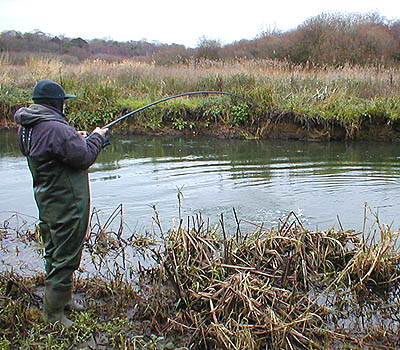
A thin lip screams away.
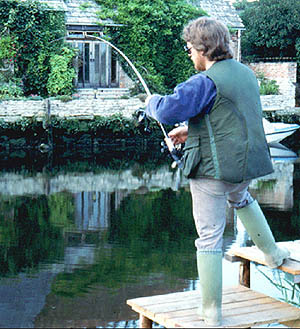
A bass almost beaten.
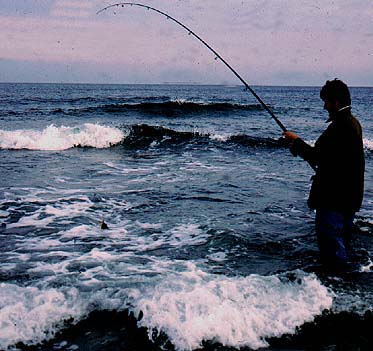
A bigger bass bends the rod.
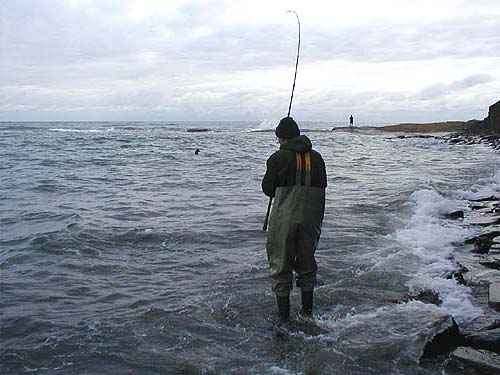
Garfish on fly gear.
